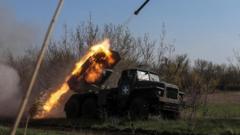In a significant shift in defense policy, Latvia's Parliament has voted to exit the 1997 Ottawa Treaty, which prohibits the use of anti-personnel mines. This decision follows a coordinated agreement among three Baltic nations—Latvia, Lithuania, and Estonia—along with Poland, to leave the convention due to heightened security concerns stemming from Russia's military actions in Ukraine.
Latvia's Historic Exit from Land Mine Convention Amidst Security Concerns

Latvia's Historic Exit from Land Mine Convention Amidst Security Concerns
Latvia becomes the first Baltic state to withdraw from the Ottawa Treaty, citing increased military threats from Russia.
As part of a broader response to perceived threats from Russia and Belarus, Latvia's withdrawal marks the first action from the regional coalition aimed at enhancing national security. Defense ministers from the four NATO countries highlighted the growing military threats to bordering NATO members as a critical factor influencing this decision, particularly since Russia’s full-scale assault on Ukraine began in 2022. Following Latvia, Finland has announced plans to join this exit, potentially leading to a domino effect among other Eastern European nations.
This collective departure challenges decades of progress achieved in arms control since the Cold War, casting doubt on global disarmament efforts targeted at minimizing the impact of such hazardous weaponry on civilian populations. The Ottawa Convention was established during a period when many hoped for a reduction in East-West tensions, promoting disarmament on a global scale. Notably, significant military powers, including the United States, Russia, and China, never ratified the treaty, indicating an enduring divide in international arms control perspectives.
The impetus for exiting the convention was particularly strong in Lithuania, which shares borders with both Belarus and the Russian enclave of Kaliningrad. Concerns about Lithuania's security were magnified following a visit by the former Lithuanian defense minister to the Belarus-Ukraine border, culminating in calls for more robust defense mechanisms against potential aggression.
As Latvia takes this bold step to enhance its national security in an increasingly volatile region, the implications for international treaties governing military conduct remain uncertain, highlighting the ongoing tension between humanitarian goals and national defense imperatives.
This collective departure challenges decades of progress achieved in arms control since the Cold War, casting doubt on global disarmament efforts targeted at minimizing the impact of such hazardous weaponry on civilian populations. The Ottawa Convention was established during a period when many hoped for a reduction in East-West tensions, promoting disarmament on a global scale. Notably, significant military powers, including the United States, Russia, and China, never ratified the treaty, indicating an enduring divide in international arms control perspectives.
The impetus for exiting the convention was particularly strong in Lithuania, which shares borders with both Belarus and the Russian enclave of Kaliningrad. Concerns about Lithuania's security were magnified following a visit by the former Lithuanian defense minister to the Belarus-Ukraine border, culminating in calls for more robust defense mechanisms against potential aggression.
As Latvia takes this bold step to enhance its national security in an increasingly volatile region, the implications for international treaties governing military conduct remain uncertain, highlighting the ongoing tension between humanitarian goals and national defense imperatives.






















